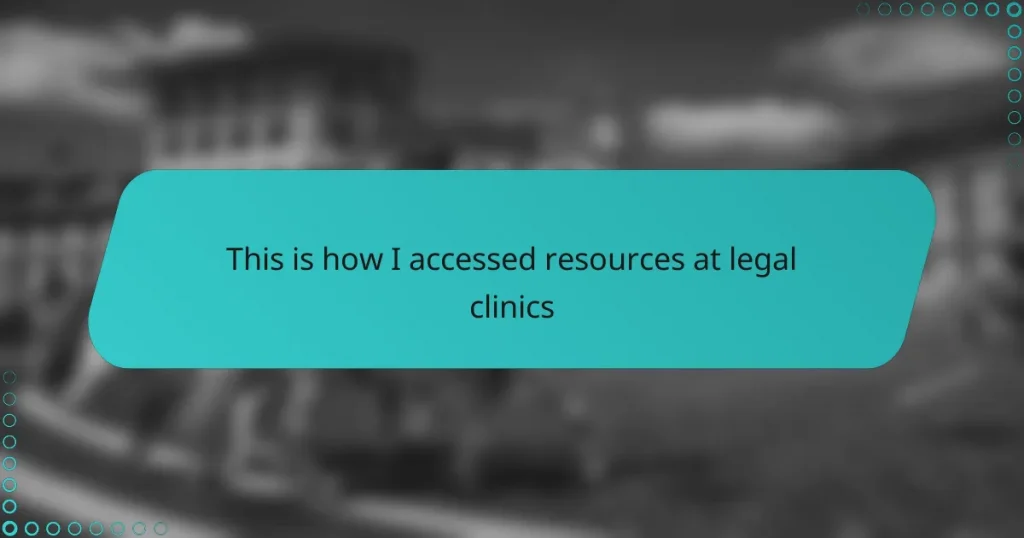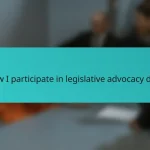Key takeaways
- Legal advocacy combines understanding the law with empathy, focusing on personalized support for individuals navigating legal challenges.
- Legal clinics offer a variety of services beyond advice, including workshops and community resources, making them essential for tailored assistance.
- Being prepared for a visit, including organizing documents and questions, helps maximize the effectiveness of consultations at legal clinics.
- Sharing personal experiences with clinic staff fosters trust and opens up additional resources, enhancing the support gained from legal advocacy.
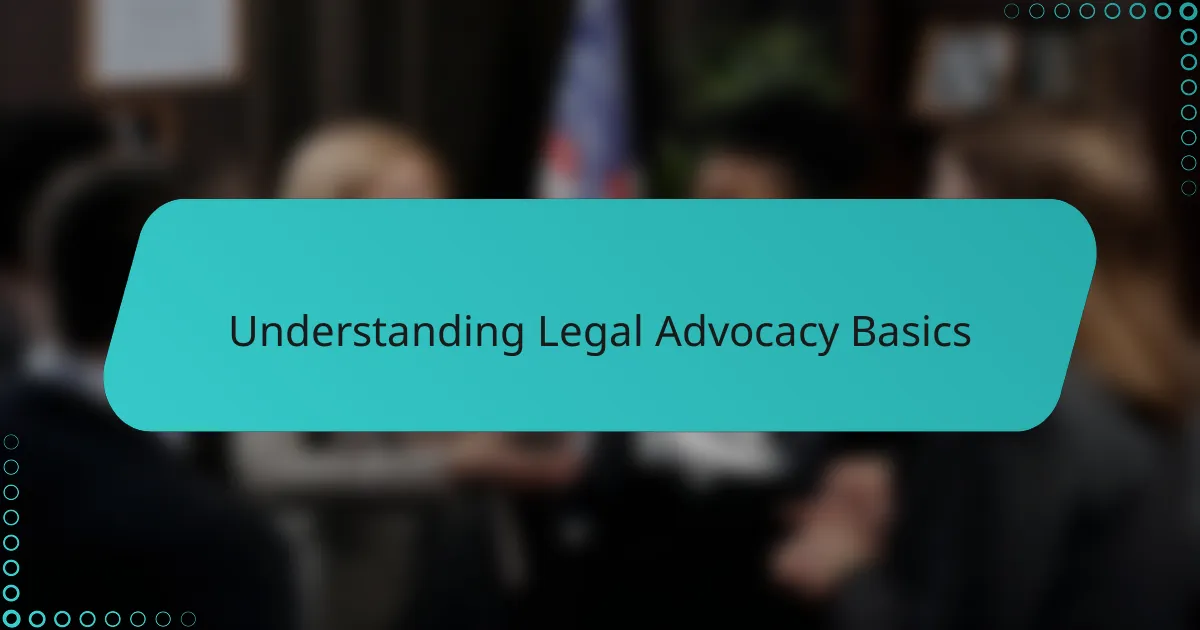
Understanding Legal Advocacy Basics
Legal advocacy, at its core, is about giving a voice to those who might otherwise feel unheard in the face of complex legal systems. When I first encountered legal advocacy, I was struck by how much it relies on understanding both the letter of the law and the real-world impact on people’s lives. Have you ever wondered why some cases move swiftly while others linger endlessly? It’s often the strength of advocacy that makes the difference.
What I’ve learned is that legal advocacy isn’t just about arguing in court; it’s about navigating various resources, building relationships, and persistence. I experienced this firsthand when seeking help at a legal clinic, where advocates didn’t just provide legal advice but also guided me through emotional uncertainty. This holistic approach is what makes legal advocacy profoundly effective and deeply human.
Understanding these basics changed how I viewed legal support. It’s not merely a set of technical skills but a commitment to justice driven by empathy and strategic action. How do you see advocacy shaping your own experience or approach to legal challenges? Reflecting on this question can help clarify why legal advocacy matters so much.
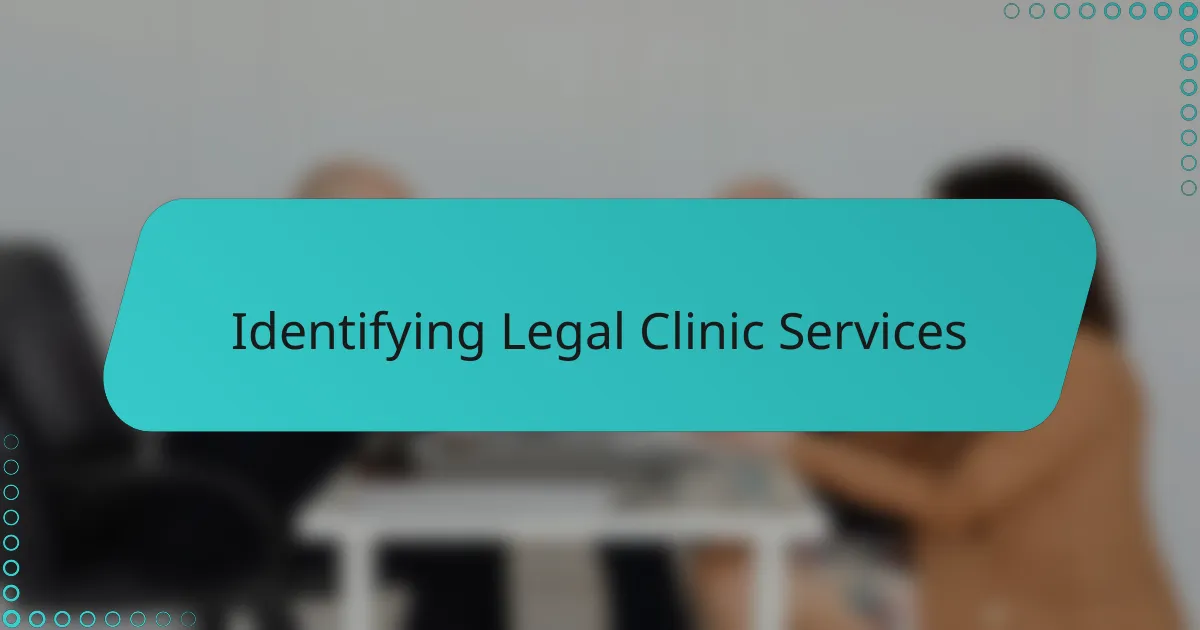
Identifying Legal Clinic Services
Recognizing what services a legal clinic offers was a crucial step for me when I first sought help. At times, the range can seem overwhelming—do they handle family law, tenant rights, or immigration issues? I found that asking direct questions about their specialties helped me zero in on whether they could truly assist with my specific situation.
It struck me how some clinics not only provide legal advice but also offer workshops, document review, and even referral services. This made me realize that “legal clinic” isn’t just a one-size-fits-all label; it’s a spectrum of support tailored to different needs. Have you ever felt uncertain about what kind of legal help you actually need? That uncertainty is normal, and clarifying services can ease a lot of that stress.
What I appreciated most was how approachable the staff were in explaining their offerings without legal jargon. Their willingness to break things down made the whole process feel less intimidating and more manageable. This personal connection can make all the difference when you’re navigating something as daunting as the legal system.
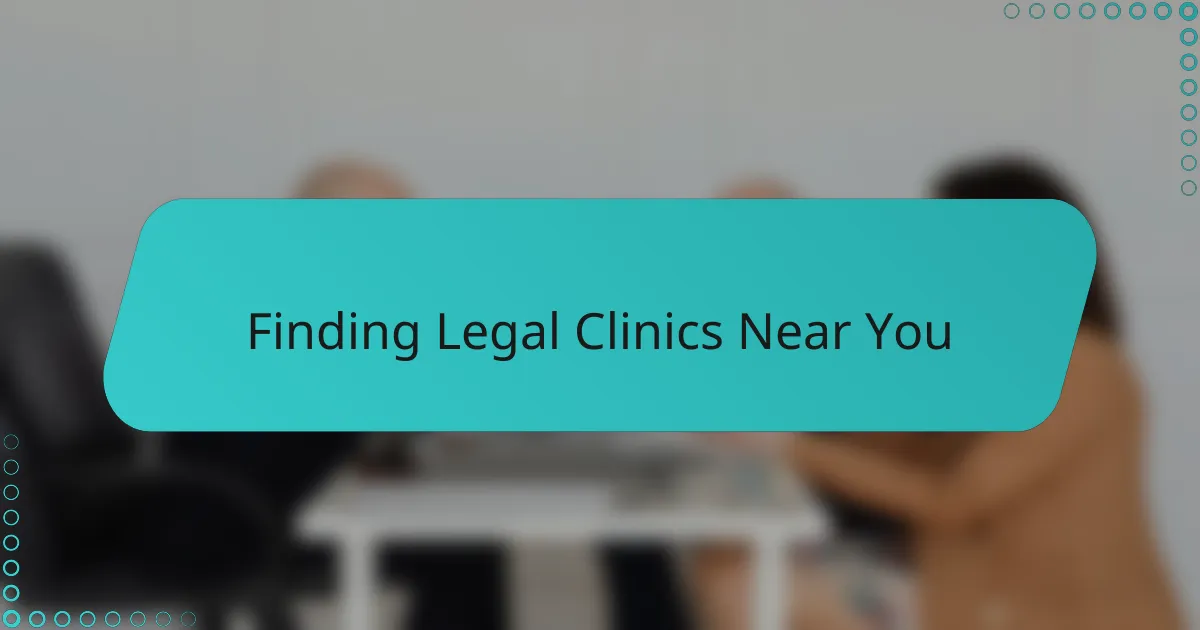
Finding Legal Clinics Near You
When I first decided to find a legal clinic near me, I quickly realized how many options there were, which was both comforting and overwhelming. Have you ever typed “legal clinics near me” into a search engine and stared at the endless list, unsure where to begin? What helped me was narrowing down clinics by location and then checking their websites or calling to confirm the services they offered.
Sometimes, just asking neighbors, friends, or local community centers about nearby clinics made all the difference. I remember feeling a mix of hope and anxiety when I dialed that first number, but the friendly voice on the other end reassured me I was in the right place. This personal connection gave me the confidence to move forward.
Another valuable tip I learned was to look for clinics affiliated with local law schools or nonprofit organizations. These often have up-to-date resources and dedicated volunteers eager to help. Have you considered how these affiliations might affect the quality or focus of the help you receive? From my experience, it can make the process smoother and more supportive.
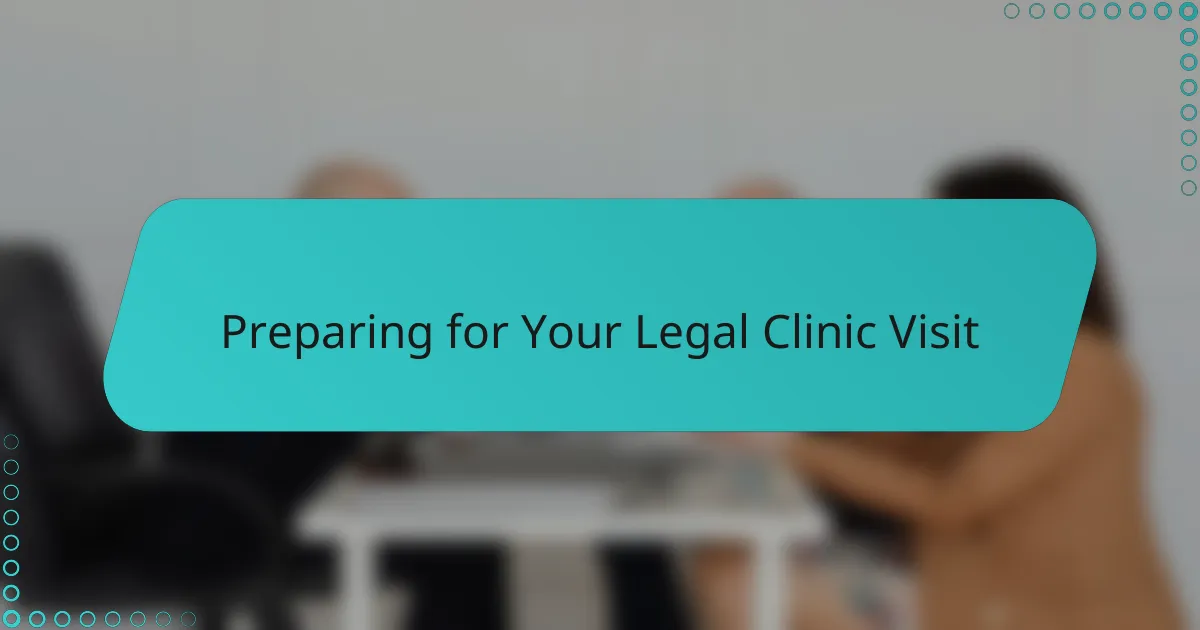
Preparing for Your Legal Clinic Visit
Before my first visit to a legal clinic, I spent time gathering all the relevant documents and details about my situation. Have you ever felt unsure what exactly to bring? From what I experienced, having clear paperwork not only saved time but also made the whole conversation feel less overwhelming, as if I was ready to face the process head-on.
I also jotted down the key questions and concerns I had beforehand. This made me feel more in control during the consultation, rather than trying to think on the spot. You might wonder if this level of preparation is necessary—but trust me, it made the difference between a productive visit and a confusing one.
Finally, I reminded myself that it’s okay to be nervous. Walking into a legal clinic can feel intimidating at first, but those moments of anxiety eased as soon as I met the approachable staff. Have you ever noticed how a simple friendly smile can change your entire experience? That human connection is often what turns apprehension into empowerment.
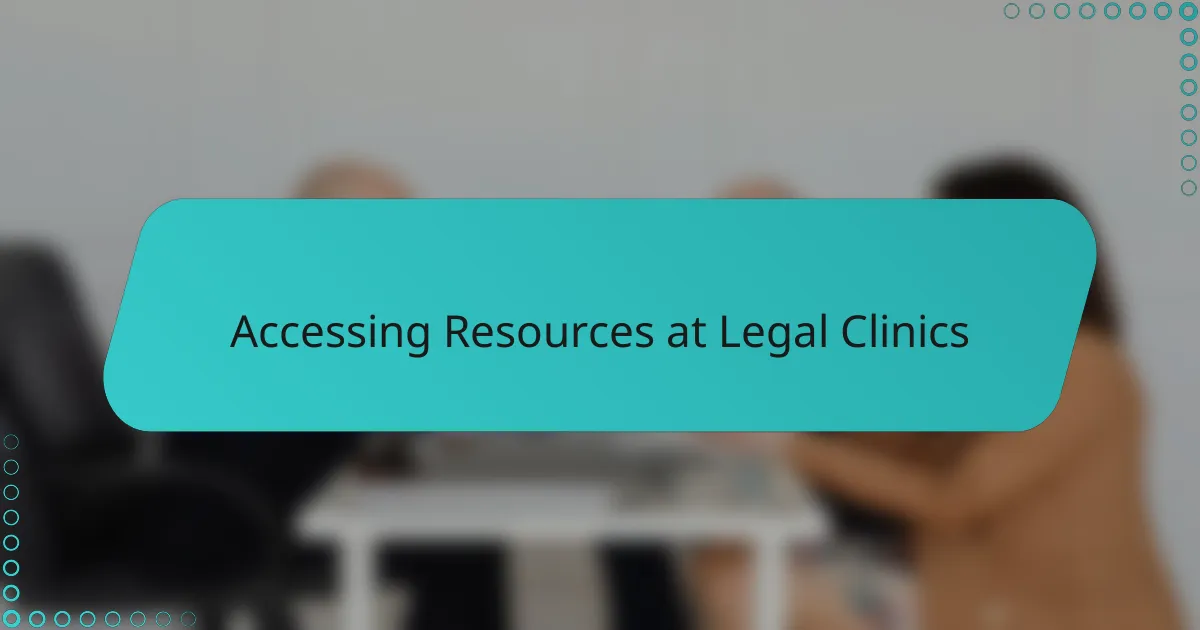
Accessing Resources at Legal Clinics
Accessing resources at legal clinics was initially a bit daunting for me—I wondered, where do I even start? What helped was simply walking into the clinic and asking the staff about the kinds of support available, which ranged from legal advice to workshops and document help. Have you ever felt unsure what you qualify for? Knowing what’s on offer made me feel less alone in a confusing system.
One thing I quickly realized is that resources aren’t just handed over; they’re shared through trust and communication. For example, when I expressed my concerns openly, the clinic staff guided me to additional materials and community programs I hadn’t even heard of. It made me appreciate how much the human connection matters in accessing these resources effectively.
I also discovered that timing plays a role—some resources require appointments, others are drop-in. I found calling ahead and asking about their procedures saved me a lot of waiting and uncertainty. Have you ever shown up somewhere and felt lost because you didn’t know what to expect? That small step of reaching out first transformed my experience from overwhelming to manageable.
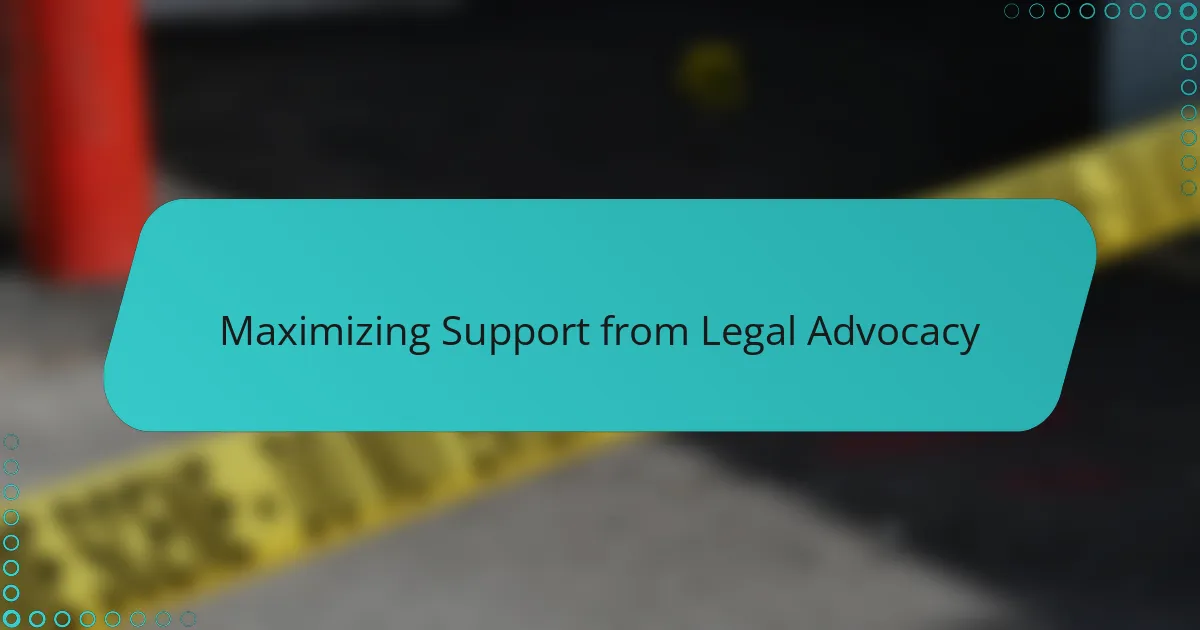
Maximizing Support from Legal Advocacy
Navigating legal advocacy effectively means more than just showing up; it’s about actively engaging with the advocates and making the most of their expertise. When I began to ask specific questions about my case and the resources available, I noticed a shift—the support became tailored, relevant, and far more impactful. Have you ever felt like your concerns were just skimmed over? Direct communication can change that dynamic entirely.
Another thing I learned is to be proactive in following up and clarifying next steps. Legal advocates often juggle many cases, so staying in touch ensures you don’t miss out on critical information or appointments. I found that sending a quick email or making a call after my initial visit made me feel more confident and connected to the process, rather than left in the dark.
Timing and attitude also shape the experience. Approaching advocacy with openness and patience allowed me to build rapport and trust, which in turn unlocked resources I hadn’t anticipated. Have you noticed how a willingness to listen and learn can open doors that seemed closed? That mutual respect between client and advocate is the cornerstone of maximizing support.
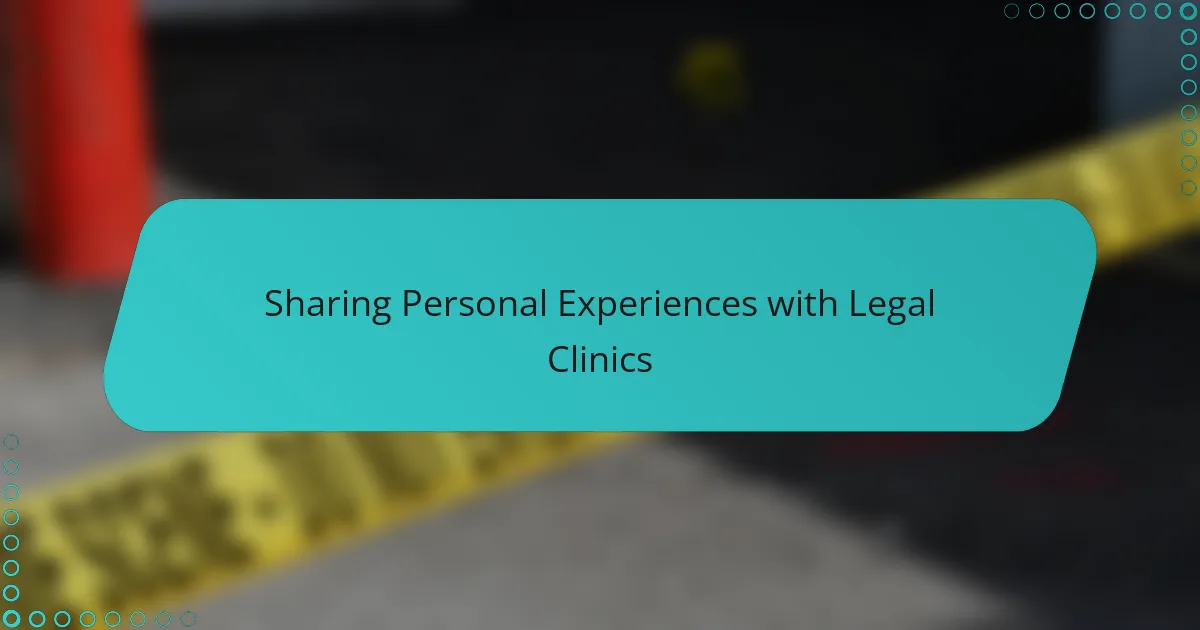
Sharing Personal Experiences with Legal Clinics
When I first shared my story with the legal clinic staff, I was unsure how much to reveal. Have you ever hesitated, wondering if your personal details might complicate things? I learned that openness actually helped the advocates understand my situation better and connect me with resources I didn’t even know existed.
I remember feeling both vulnerable and relieved during those conversations. It struck me how much empathy the staff showed—they weren’t just listening to legal facts but really hearing my concerns. Sharing my experience turned the clinic visit from a cold appointment into a moment of genuine support.
Sometimes, reflecting on my story after each session helped me process the challenges I faced. Have you noticed how talking about your experience can bring clarity and even a sense of empowerment? For me, these personal exchanges at the clinic became a crucial part of navigating the legal maze.
